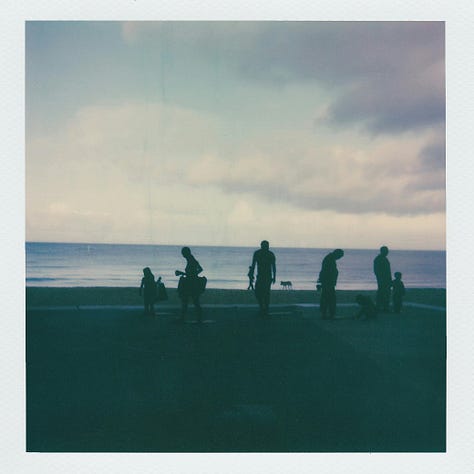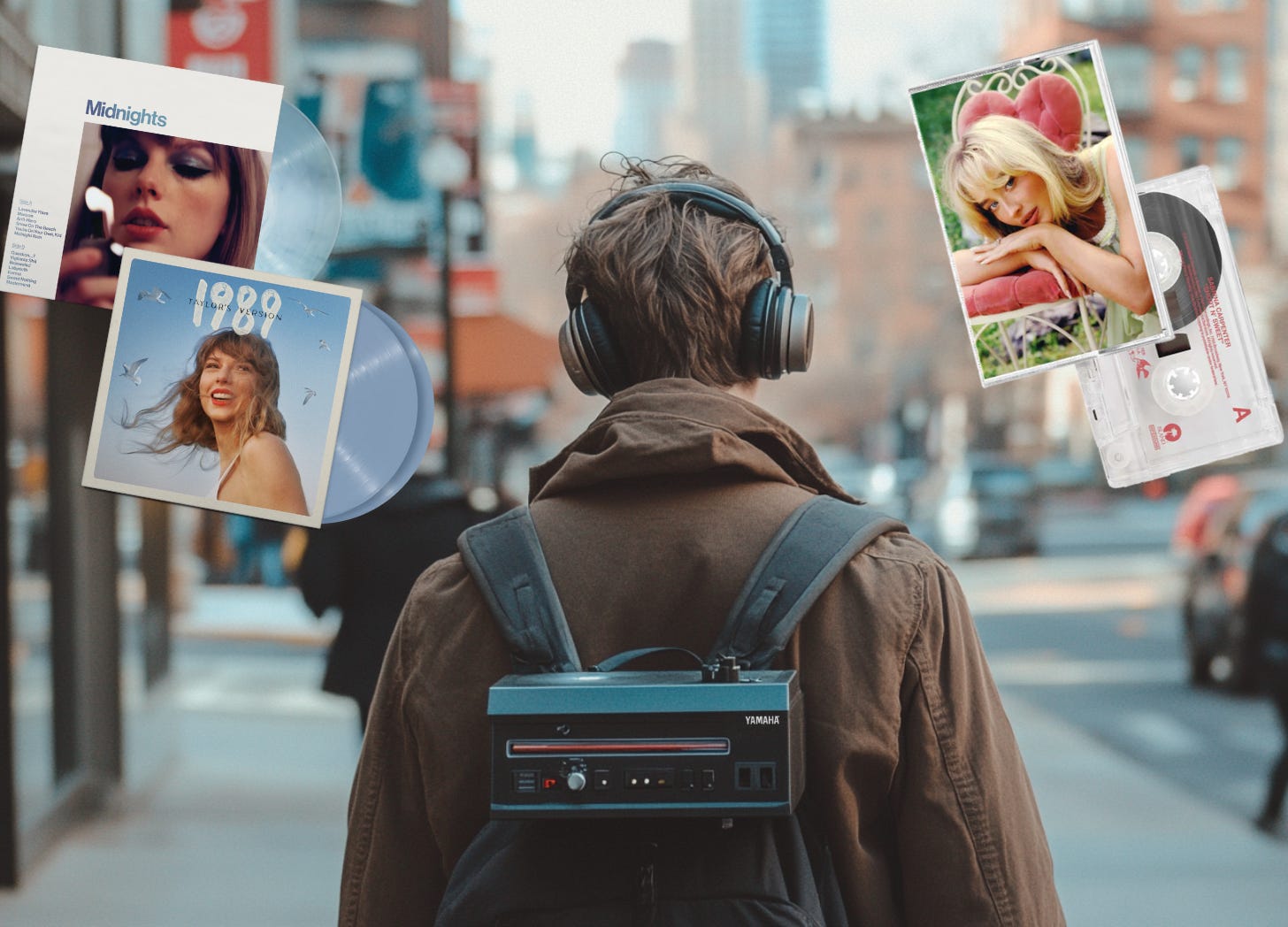Vinyls, CDs and... cassettes?: Why Gen Z is bringing back analogue music
an analogue renaissance
Welcome to the latest edition of The Gen Zer. This week, we take a dive into the world of analogue music and look at why Gen Z are splashing on CDs, vinyls and cassettes. We also discuss the rise of social searching, the plight of iPad kids, and why Gen Z need their own Delia. Read on for more . . .
It’s been a few years since Millennials resurrected the vinyl market, investing in record players and LPs despite the practicality of streaming, and now Gen Zers are doing a similar thing with CDs.
A lot of us have probably thought that CDs are confined to the history books. Maybe — just maybe — you still have a few CDs lurking in your car somewhere, but I haven’t heard anyone talk about buying a new CD in years.
That may be changing, however. In 2021, revenue from CDs rose for the first time in two decades. Revenue had been dropping continuously and reached $480 million in 2020, and yet the year after — still in the midst of the pandemic and the accompanying economic slowdown — total revenue from CDs increased by over $100 million. Together with vinyl sales (which have been steadily increasing for well over a decade now), the shift meant that physical media as a whole saw its first increase in sales since the long-ago year of 1996.
Streaming remains dominant, of course. CDs accounted for 92% of music revenue in the US in 2002 and its days as the main way we listen to music are never coming back, and yet, interestingly, more and more people are buying CDs alongside listening to music via streaming. For Gen Z, the two formats each fulfil a different purpose.
It’s also worth highlighting that many Gen Zers are too young to ever really remember listening to CDs. I’m on the older side of the generation, and I still remember car journeys spent with a portable CD player on my lap, wired headphones plugged in. At home when I was younger we had racks of CDs in the kitchen — something that feels strangely faraway now — but many Zers would have been born too late to remember ever buying or using CDs, let alone vinyls or cassettes.
The youngest Zers were born in 2012: a decade after the heyday of CDs. By the time they were old enough to really notice these things, many of the once-ubiquitous disks would have been gathering dust in attics and charity shops. And yet now, in 2024, CDs are reappearing in Gen Z bedrooms all over.
The analogue renaissance isn’t just confined to CDs and vinyls, either. Cassettes are making a smaller comeback, with artists like Taylor Swift and Olivia Rodrigo releasing quirky cassette versions of their new albums. And outside of music, film and polaroid cameras have also been making a steady comeback, as people seek out a slower, more intentional and less ‘perfect’ approach to photography over the easy and clean method of simply pulling out your iPhone.






So what’s behind Gen Z’s re-adoption of analogue music? There are a few main reasons:
Community & Fandom
Artists like The Weeknd, Billie Eilish and Sabrina Carpenter are all releasing physical editions of their new albums alongside digital and streaming. For artists it’s a good way to boost sales, but for hardcore fans it’s a way to support your favourite artist and get your hands on some exclusive merch. Physical editions of albums come with unique artwork and the covers themselves can look great. If you’re a superfan wanting something to decorate your shelves with, a Vinyl cover of your favourite album isn’t a bad shout.
On top of that, some artists offer deluxe physical editions of their albums that include songs unavailable on streaming platforms. This has drawn some heavy criticism; if there are multiple versions of a physical album, each with a different hidden song, then fans might have to fork out hundreds to get their hands on all of the artist’s music. Still, many stans don’t mind the costs, in a similar way that some of the most fervent football fans might buy every version of their team’s shirt.
Nostalgia
As I’ve said, CD sales peaked at the start of the 21st Century more than twenty years ago. Whether or not we remember those times, a lot of Gen Zers feel nostalgic for those days and the decades before. It was a time when culture was made up of objects people could hold in their hands, and many Zers long for an alternative to the endlessly changing, virtual world we seem to inhabit now. Rightly or wrongly, for some there’s a sense in which things like the experience of listening to music or taking a photo held more weight and possessed more meaning back then, precisely because it was a slower and more difficult process. Now if I want to share a piece of music with you, you don’t have to go to a store, get your hands on an album and load it into a record player. You can just mindlessly click the link below:
A Break from Screens
In a similar sense, physical music offers a break from infinite scrolls and the constant distractions of social media. A CD or a record offers an analogue, tactile experience that separates the act of listening to music from the endless sea of content that comes with our phones.
Increasingly, it’s a question of bringing back a sense of intentionality into our actions and habits. I’ve written a lot about Gen Z’s push for a healthier lifestyle in this newsletter, and I think part of our generation’s reversion to physical formats is linked to this. There’s an increasing awareness of the risks that too much screen-time can have, from missing out on real life, to developing a social media addiction, to low self-esteem and poor mental health. Music can and should be an escape from all of these things, so perhaps it’s no surprise that Zers are finding ways to separate them.
Of course, streaming isn’t going anywhere. Having Spotify on your phone is too convenient to ditch entirely, and it is nice being able to share and discover new music so easily (go check out the song above; it’s great). What’s changed is the role that CDs and analogue music are playing — as an accompaniment to streaming rather than a rival, and as a welcome break from the virtual world.
Gen Z around the Web
the latest stories in youth culture and changing trends . . .
iPad kids speak up (vox)
Gen Alpha don’t always get the best rep — they’re known as ‘iPad kids,’ for a start, tapping into the idea that the kids are addicted to technology and have lost (or simply have never developed) the ability to interact in the real world. Vox took a look at this idea in a recent article, talking to a few Alphas about whether it’s all really that bad. Read more
Are social media algorithms breeding misogyny and violence? (thred)
There’s mounting evidence that men and boys are being pushed violent and misogynistic content online — without deliberately searching for or engaging with it. This is leading not only to a stark ideological divide between young men and women, but there are worries about it leading to increased violence against women and girls. Despite this, it’s really not clear why social media algorithms seem to push manosphere content so heavily. The way they work remains incredibly opaque. Read more
Gen Z are ditching Google search for TikTok and Instagram (fortune)
‘Googling’ entered the Oxford English Dictionary in June 2006 and since then the search engine has endured as the first port of call for anyone wanting to search something up online. (‘Google’ is even the most searched-for word on its competitor, Bing.) Now, however, Gen Z are “searching” rather than “googling,” and it’s not just their way of talking that’s changing: they’re 45% more likely to use social searching on sites like TikTok and Instagram instead of Google (compared to about 20% of Gen X, and less than 10% of Boomers). When it comes to news consumption, there are some worries that this could make Gen Z more narrow minded. Read more
20-Somethings are in trouble (the atlantic)
In America, you might think that it’s the teens who are the most depressed and anxious, or the elderly who are loneliest, and yet it’s actually those in their twenties who are more depressed, more anxious, and lonelier than any other age group. Even Richard Weissbourd, who led the study by the Harvard Graduate School of Education, was taken aback by the findings. (Interestingly, they found that teenagers and senior citizens actually have the lowest levels of anxiety and depression.) Read more
Why Gen Z needs its own Delia (the telegraph)
“Food is bigger than it’s ever been, more fashionable, more impressive – and yet we are cooking less.” In an age where there are a million different recipes for any single dish, there’s an argument that we’re still missing the skills and techniques to experiment for ourselves — something an online initiative is trying to fix. (In other Gen Z kitchen news, most of us apparently don’t own a corkscrew. Is the rise of the screw-top to blame, or are we just not drinking wine anymore?) Read more
That’s all for this week! Make sure to subscribe for the latest on Gen Z and youth culture, and check out The Common Thred for a weekly roundup of the latest news, trends and thought pieces.
See ya soon,







There’s one practical thing that I’ve found many of my generation and younger often don’t even consider - Blu-Ray disks.
Streaming ate the video market too.
Because of that some folks have never seen their favorite movies on Blu-Ray.
May I recommend?
You’ll see that the quality of the streaming is compressed so much that many crisp details are lost. You’ll see the movie anew.
Pick something highly visual, of course, like Lord of the Rings, or Dune, or Avatar.